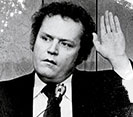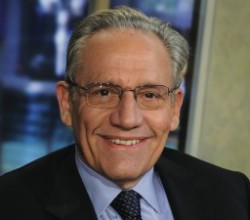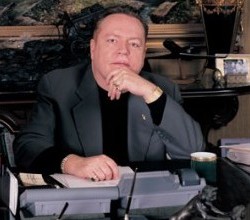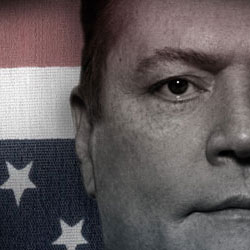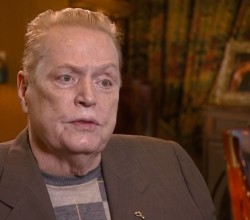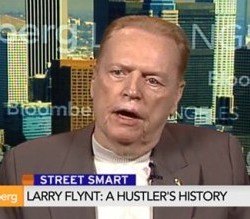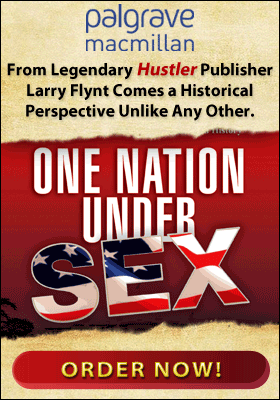Larry Flynt: Ultimate Recognition

Larry Flynt was awestruck after seeing his name on the American National Tree for the first time during a recent visit to the National Constitution Center in Philadelphia. As a courageous defender of the First Amendment, Flynt has been honored with a plaque on the monument, which pays tribute to 100 Americans—both famous and obscure—whose actions have helped safeguard the U.S. Constitution. We sat down with Larry to discuss his thoughts on being part of such select company and why freedom of speech is so important.
HUSTLER: How did it feel to see your name on the American National Tree?
LARRY FLYNT: It was pretty exciting. I had heard that it was there, but I didn’t realize what a big deal it was, so I never gave it that much thought. Sidney Poitier, the actor who’s a friend of mine, had told me four or five years ago that it was there. I was in Philadelphia on my [One Nation Under Sex ] book tour, so I thought I’d go to the Constitution Center and take a look. It was really kind of a strange experience because the curator didn’t charge us the cover charge, and everyone was fussing over us the whole time. I couldn’t quite understand what this was about until the curator took me to the very middle of the Constitution Center, where they had this exhibit called the American National Tree.
Tell us about the exhibit.
It was an electronic monument with the inscription “This monument is dedicated to 100 people who advanced and protected the Constitution of the United States of America.” And if you press a button where your name is, a big video explodes— one foot by two foot wide—and it has pictures of you. It also has a bio spelling out the different reasons why you were selected to be on the tree. Well, selected is really not the process because I asked the curator, “Who decides who the 100 names are?”
He said, “It’s done by scholars and several universities around the country. You can only put one name on once a year, and consequently one name gets taken off. But you don’t ever have to worry about your name coming off.”
Were you included in the first 100 honorees when the Constitution Center opened in 2003?
Yes, and I was really overwhelmed about it because it’s such a significant part of history. You’re right in the center of where it all happened. I said to the curator, “Why are you guys making such a big deal of me being here?” He said, “Well, Mr. Flynt, most of those people up there are dead. So they’re not gonna come. But you’re alive.” It was a very moving experience. I would have gone there and visited much sooner if I’d known the extent of the display.
Who are you next to on the tree?
Katharine Graham, who was the owner of the Washington Post , for her role in Watergate. And Frederick Douglass, the first black man invited to the White House, who was an author and advocate for civil rights. I’m right between those two.
Is the tree part of a larger exhibit?
Yes. There’s a room where the Constitution was drafted. The center has life-size bronzes of George Washington, John Adams and Benjamin Franklin, three of our Founding Fathers. These bronzes are just so realistic, it’s unbelievable. You get this humbling feeling as you go through the center and realize all the history that took place there. It’s overwhelming.
The tree is located right in the heart of Constitution Center. It is the main display. You would have thought the Founding Fathers— the drafters of the Constitution—would have been front and center in the exhibit, but they aren’t. They’re in a side room. I’m not questioning why the Constitution Center did it, but the tree was right there, a living, breathing, interactive piece of history.
Why is protecting the First Amendment so important to you?
Without the First Amendment, nothing else is of any importance at all. If the First Amendment goes, we lose everything. Not just freedom of speech but freedom of religion. It’s the cornerstone of our whole democracy, and it’s withstood the test of time in many court cases down through the years. That’s why I’ve been proud to be a part of upholding the First Amendment. Many people don’t understand that freedom of speech is not the freedom for the thought you love. It’s the freedom for the thought you hate the most. We pay a price to live in a free society, and that price is toleration. We have to tolerate things that we don’t necessarily like so we can be free. And that’s what most Americans don’t understand.
If you go out and take a poll and ask people, “Do you believe in free speech,” 98% of them will say they do. Then ask them, “How about pornography? How about flag burning? How about hate speech?” All of a sudden your almost 100% support falls to below 50% because everybody has their own vision of what the First Amendment is supposed to be, what kind of speech it’s supposed to protect. That’s why it really needs to be protected because the courts and individuals throughout history and even today are attempting to compromise the First Amendment every chance they get.
Are these limitations to the First Amendment the most pressing free speech issue in America right now?
We had a former Supreme Court justice who said the First Amendment is not absolute. You can’t scream “Fire!” in a crowded theater. Well, I happen to think he’s wrong. I think you can scream “Fire!” in a crowded theater. If anyone is hurt as a result of your doing that, then that’s the crime you should be prosecuted for. I’m an absolutist. I’m a purist when it comes to the First Amendment. I just don’t think we should compromise it in any way.
But compromise is just part of it. There’s also outright abuse. If certain political leaders had their way about it, there wouldn’t be a First Amendment. You would just shut up and do things their way. That’s the way they play the game.
You’re known for pushing the envelope and taking risks. Are there aspects of free speech even you wouldn’t touch?
Of course there are. I would never exploit children because you’re violating the rights of someone not old enough to speak for themselves. But I think that’s a crime totally separate from the First Amendment.
A lot of people try to put everybody on a guilt trip about the First Amendment by saying, for example, hate speech violates the rights of others. Well, there are laws to protect the rights of others. The First Amendment should not be caught in a web because it’s purely free speech.
You’ve obviously accomplished much in your life. Is there anything you haven’t done and want to do?
Accomplishing what I did in Philadelphia—it’s difficult to outdo that. It’s almost the equivalent to being honored on Mount Rushmore.
What do you want your legacy to be?
Being remembered as someone who fought to expand the parameters of free speech in a good way. I think that would be a great legacy.

